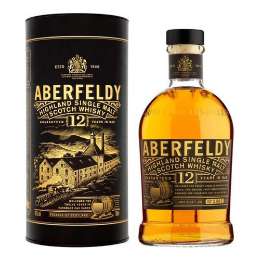Scotch Whisky
Scotch belongs to the most famous whiskies worldwide. Discover rare Scotch whiskies of high quality and maturation. Choose between Aged Whiskies, Smoked Whiskies or Islay Whiskies.
Ballantine's Finest Whisky 700ml
Frequently Asked Questions
01What differentiates Scotch whisky from other whiskeys?
To identify a whisky as Scotch whisky, aging must have occurred in Scotland, exclusively in oak casks and for a minimum of three year.
02Which are the differences between Single Malt and Blended scotch whisky?
Single malt is exclusively made of barley malt, from one and only distillery. It does not matter if it results from mixing spirits from different casks. The content of a bottle is still called single malt whisky, even if, for example, it is a mixture of three-year-old, eight-year-old and twelve-year-old single malts. Practically everything else is a blend. A whisky is called blended when made of malted barley from different distilleries. It is also called blended whisky, if anything other than malted barley (even unmalted barley) was involved in the production.
03How aging affects the flavor of Scotch whisky?
The barrel acts as a donor of desired chemicals. The vanilla, leather, coffee and chocolate flavors found in whisky are due to the wood. The barrel acts as a filter for unwanted chemicals. Compounds, mainly sulphides, often responsible for problems in the taste of whisky, are absorbed by the wood and removed from the distillate. In general, the transformation of the original, one-dimensional flavored spirit into the exuberant final product we enjoy, starts with aging in the wooden barrel, whether it is new or used in other drinks’ aging.
04 What is the production process of Scotch whisky?
On the eastern side of the Atlantic, barley plays a major role in whisky making. Corn, rye and oats simply complete the “landscape”. Thus, the vast majority of Scotch whiskies are made from barley. After its seeds have started germinating, the germination is stopped through drying, whereupon the malt is produced. It is then ground, mixed with water and fermented. The resulting alcoholic product is distilled twice, in a still. Finally, the spirit is aged in a barrel and turned into whisky.
05Which are the whisky-making regions of Scotland and how do they affect its flavor?
In the Lowlands region we find soft, floral whiskies, often considered the lightest in Scotland. In the Highlands area, floral elements give way to fruity elements. Whiskies from this particular region are usually sweeter, with a stronger body. In the Speyside region, the whiskies are similar to those of the Highlands, but excel in the sense of vanilla and spice. In the Campbeltown region, whiskies are famous for their savory character, often with oily notes. In the region of the Islands, which stretch to the west of mainland Scotland, from north to south, the wealth of whisky flavors is endless and associated with each distillery. In Islay region, which (although an island) does not belong to the Islands, the whiskies express a world famous smoky character.

























